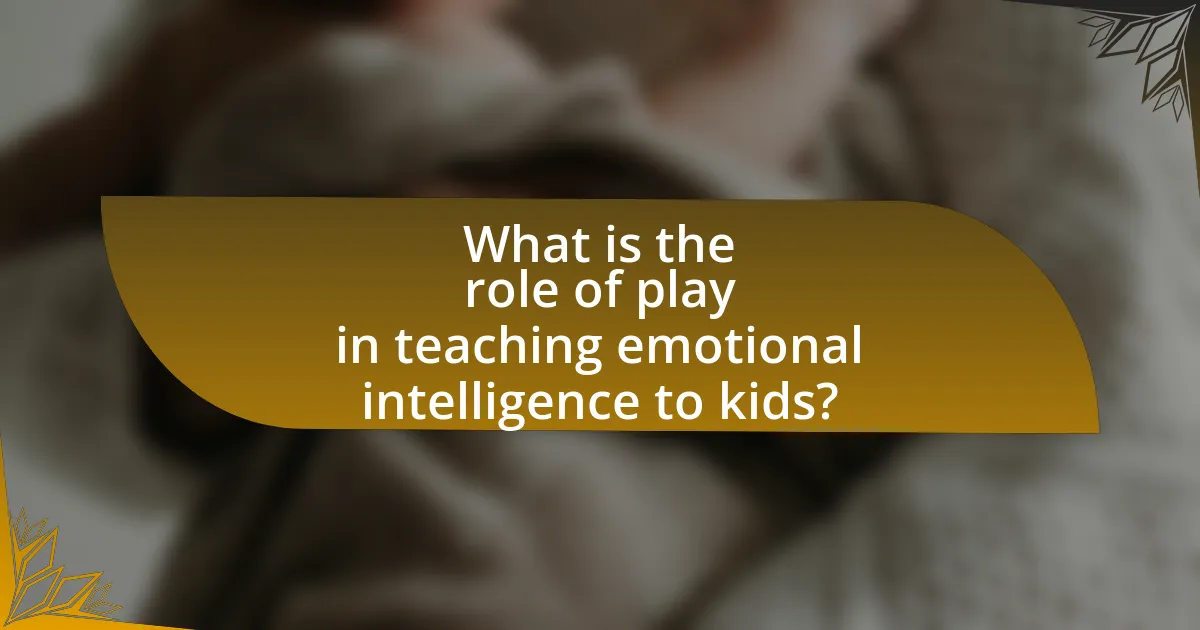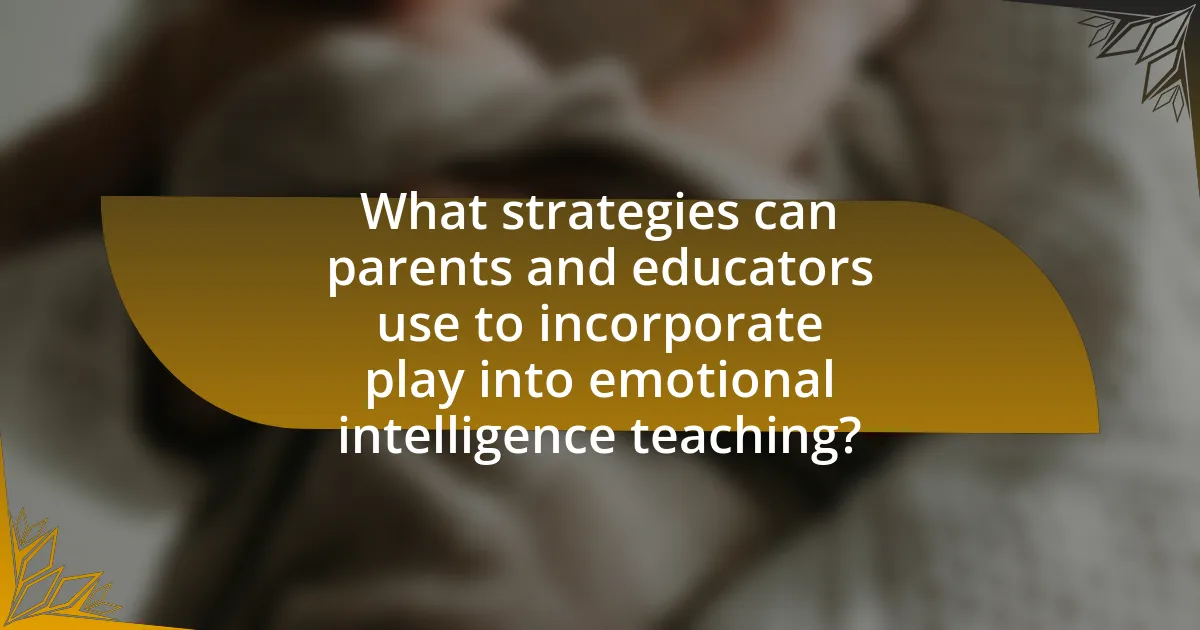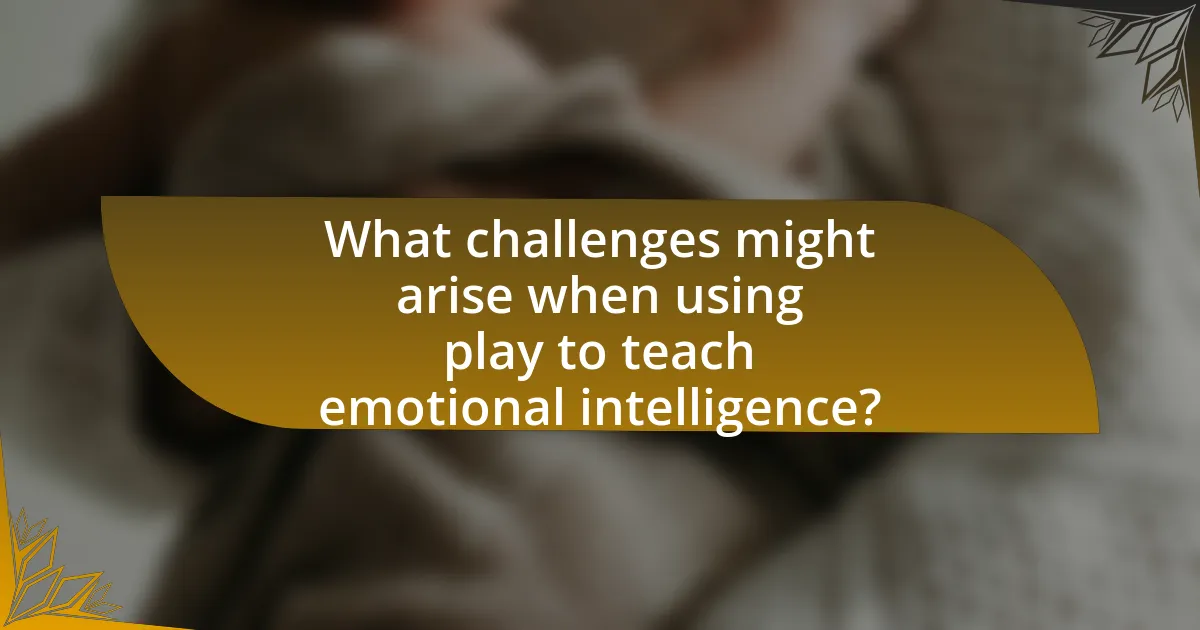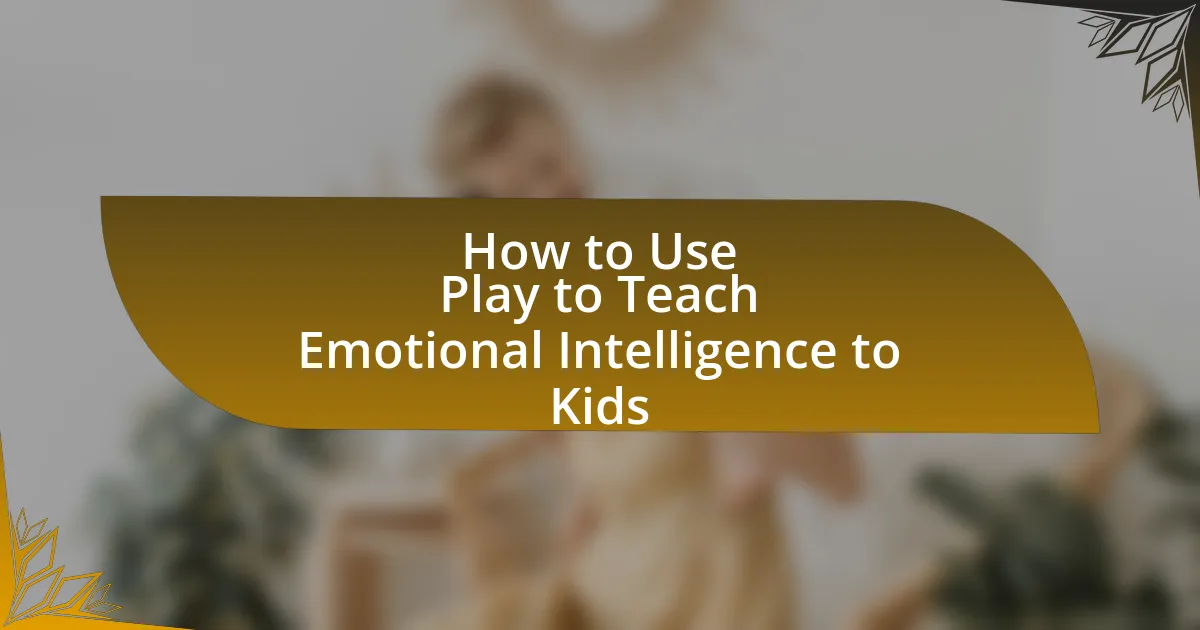The article focuses on the role of play in teaching emotional intelligence to children, emphasizing its importance in fostering skills such as empathy, emotional regulation, and social competence. It outlines how different types of play, including role-playing and cooperative games, effectively facilitate emotional learning across various age groups. The article also discusses the significance of emotional intelligence in children’s development, the key components involved, and practical strategies for parents and educators to incorporate play into emotional learning. Additionally, it addresses common misconceptions about the educational value of play and provides resources to support this learning approach.

What is the role of play in teaching emotional intelligence to kids?
Play serves as a crucial mechanism for teaching emotional intelligence to kids by providing them with opportunities to explore and express their emotions in a safe environment. Through play, children engage in role-playing scenarios that allow them to practice empathy, recognize emotional cues, and develop social skills. Research indicates that children who participate in play-based learning demonstrate improved emotional regulation and interpersonal relationships. For instance, a study published in the journal “Child Development” found that children who engaged in cooperative play showed higher levels of emotional understanding and empathy compared to those who did not. This evidence underscores the effectiveness of play as a tool for fostering emotional intelligence in children.
How does play facilitate emotional learning in children?
Play facilitates emotional learning in children by providing a safe environment for them to explore and express their feelings. Through play, children engage in role-playing scenarios that allow them to practice empathy, recognize emotions in themselves and others, and develop problem-solving skills related to social interactions. Research indicates that children who participate in play-based learning demonstrate improved emotional regulation and social competence, as evidenced by a study published in the journal “Child Development” by researchers Brown and Dunn, which found that children who engaged in imaginative play showed greater emotional understanding and empathy compared to those who did not.
What types of play are most effective for teaching emotional intelligence?
Role-playing and cooperative games are the most effective types of play for teaching emotional intelligence. Role-playing allows children to step into different perspectives, fostering empathy and understanding of others’ emotions. Cooperative games require teamwork and communication, which help children learn to express their feelings and recognize the emotions of their peers. Research indicates that these types of play enhance social skills and emotional awareness, as evidenced by studies showing improved emotional regulation and empathy in children who engage in such activities.
How do different age groups respond to play-based emotional learning?
Different age groups respond to play-based emotional learning in distinct ways, influenced by their developmental stages. Young children, typically aged 3 to 5, engage in imaginative play, which helps them understand and express emotions through role-playing scenarios. Research indicates that this age group benefits significantly from activities that involve storytelling and pretend play, as these methods enhance their emotional vocabulary and empathy skills.
As children progress to ages 6 to 8, they begin to engage in more structured play, such as games with rules. This age group responds well to cooperative play that fosters teamwork and conflict resolution, allowing them to practice emotional regulation and social skills. Studies show that children in this range can better articulate their feelings and understand others’ emotions when involved in group activities.
For older children, ages 9 to 12, play-based emotional learning often incorporates more complex scenarios, such as simulations or role-playing games that require critical thinking and reflection. This age group is capable of deeper emotional analysis and can benefit from discussions about feelings and consequences of actions during play. Research supports that engaging in these types of activities enhances their ability to navigate social dynamics and develop resilience.
Overall, the effectiveness of play-based emotional learning varies across age groups, with younger children focusing on basic emotional recognition, middle childhood emphasizing social skills, and older children developing critical emotional intelligence through complex interactions.
Why is emotional intelligence important for children?
Emotional intelligence is important for children because it enhances their ability to understand and manage their own emotions, as well as empathize with others. This skill set is crucial for developing strong interpersonal relationships and effective communication. Research indicates that children with high emotional intelligence tend to perform better academically and socially. For instance, a study published in the Journal of Educational Psychology found that students with higher emotional intelligence scores had better academic performance and were more likely to engage positively with peers. Thus, fostering emotional intelligence in children is essential for their overall development and success in various life domains.
What are the key components of emotional intelligence?
The key components of emotional intelligence are self-awareness, self-regulation, social awareness, and relationship management. Self-awareness involves recognizing one’s emotions and their impact on thoughts and behavior. Self-regulation refers to the ability to manage emotions and impulses effectively. Social awareness encompasses understanding the emotions of others and empathizing with their feelings. Relationship management involves the skills needed to develop and maintain healthy relationships through effective communication and conflict resolution. These components are essential for emotional intelligence, as they enable individuals to navigate social complexities and make informed decisions.
How does emotional intelligence impact children’s development?
Emotional intelligence significantly impacts children’s development by enhancing their ability to understand and manage emotions, which fosters better social interactions and academic performance. Research indicates that children with high emotional intelligence are more likely to develop strong relationships, exhibit empathy, and demonstrate effective conflict resolution skills. A study published in the Journal of Educational Psychology found that students with higher emotional intelligence scores had better academic outcomes and were more engaged in school activities. This correlation underscores the importance of emotional intelligence in shaping various aspects of a child’s growth and success.

What strategies can parents and educators use to incorporate play into emotional intelligence teaching?
Parents and educators can incorporate play into emotional intelligence teaching by using role-playing games, storytelling, and cooperative activities. Role-playing games allow children to act out different scenarios, helping them understand and express emotions while developing empathy. Storytelling can be utilized to discuss characters’ feelings and motivations, fostering emotional awareness and comprehension. Cooperative activities, such as team sports or group projects, encourage collaboration and communication, essential components of emotional intelligence. Research indicates that play-based learning significantly enhances social-emotional skills, as evidenced by studies showing improved emotional regulation and interpersonal skills in children engaged in such activities.
How can role-playing activities enhance emotional understanding?
Role-playing activities enhance emotional understanding by allowing individuals to experience and express different emotions in a safe environment. Through these activities, participants can step into various roles, which fosters empathy and perspective-taking. Research indicates that engaging in role-play can improve emotional intelligence by helping individuals recognize and articulate their own feelings as well as those of others. For instance, a study published in the Journal of Educational Psychology found that children who participated in role-playing exercises demonstrated a significant increase in their ability to identify emotions in themselves and others compared to those who did not engage in such activities. This evidence supports the effectiveness of role-playing in developing emotional understanding.
What scenarios are best suited for role-playing to teach emotions?
Role-playing scenarios that are best suited for teaching emotions include situations involving conflict resolution, expressing empathy, and navigating social interactions. These scenarios allow children to practice recognizing and articulating their feelings, as well as understanding the emotions of others. For instance, a scenario where one child pretends to be upset due to a misunderstanding can help others learn to respond with empathy and support. Research indicates that role-playing enhances emotional intelligence by providing a safe space for children to explore and express their feelings, thereby reinforcing their ability to manage emotions in real-life situations.
How can children reflect on their role-playing experiences?
Children can reflect on their role-playing experiences by discussing their feelings and thoughts about the scenarios they enacted. This reflection can be facilitated through guided conversations where children articulate what they learned about themselves and others during the play. Research indicates that such discussions enhance emotional intelligence by helping children recognize and understand their emotions and the emotions of others, thereby reinforcing social skills and empathy. For example, a study published in the Journal of Child Psychology and Psychiatry found that children who engage in reflective practices after role-playing demonstrate improved emotional regulation and interpersonal skills.
What games promote emotional intelligence skills?
Games that promote emotional intelligence skills include “The Empathy Game,” “Feelings Charades,” and “Emotion Bingo.” These games encourage players to recognize, understand, and express emotions effectively. For instance, “The Empathy Game” involves players sharing personal experiences related to different emotions, fostering empathy and active listening. “Feelings Charades” requires participants to act out emotions without words, enhancing non-verbal communication skills. “Emotion Bingo” helps players identify and label emotions through visual cues, reinforcing emotional vocabulary. Research indicates that engaging in such games can significantly improve children’s emotional awareness and regulation, as highlighted in studies on social-emotional learning.
Which board games are effective for teaching empathy and cooperation?
Board games that are effective for teaching empathy and cooperation include “The Game of Life,” “Pandemic,” and “Dixit.” “The Game of Life” encourages players to make decisions that affect others, fostering understanding of different life paths. “Pandemic” requires players to work together to stop global outbreaks, emphasizing teamwork and shared goals. “Dixit” promotes storytelling and interpretation of images, enhancing perspective-taking and emotional insight. These games have been shown to improve social skills and emotional intelligence in children through interactive play.
How can outdoor games be adapted to teach emotional skills?
Outdoor games can be adapted to teach emotional skills by incorporating structured activities that focus on teamwork, communication, and conflict resolution. For instance, games like capture the flag can be modified to include roles that require players to strategize together, fostering collaboration and empathy. Research shows that children who engage in cooperative play develop better emotional regulation and social skills, as they learn to navigate their feelings and understand others’ perspectives. By intentionally designing outdoor games with specific emotional learning objectives, educators can create an environment where children practice and enhance their emotional intelligence through active participation.

What challenges might arise when using play to teach emotional intelligence?
Using play to teach emotional intelligence can present several challenges, including difficulty in ensuring that the play activities are developmentally appropriate and effectively aligned with emotional learning objectives. For instance, younger children may struggle to understand complex emotions or social cues during play, which can hinder their ability to learn emotional intelligence skills. Additionally, some children may not engage fully in play due to varying levels of interest or social anxiety, limiting their exposure to emotional learning opportunities. Research indicates that structured play can sometimes overshadow spontaneous interactions, which are crucial for authentic emotional development. Furthermore, educators may face challenges in assessing the emotional learning outcomes from play, as traditional assessment methods may not capture the nuances of emotional growth achieved through play-based activities.
How can parents address resistance to emotional learning through play?
Parents can address resistance to emotional learning through play by incorporating engaging and relatable activities that promote emotional expression and understanding. For instance, using role-playing games allows children to explore different emotions and scenarios in a safe environment, facilitating discussions about feelings. Research indicates that play-based learning enhances emotional intelligence, as it encourages children to identify and articulate their emotions while interacting with peers. A study by the American Psychological Association found that children who engage in play that involves emotional themes show improved empathy and emotional regulation skills. By selecting age-appropriate games that resonate with their child’s interests, parents can effectively reduce resistance and foster a positive attitude towards emotional learning.
What strategies can be employed to engage reluctant children?
To engage reluctant children, interactive and playful strategies should be employed, as these methods foster a sense of safety and enjoyment. Techniques such as incorporating games that promote emotional expression, using storytelling to illustrate emotional scenarios, and allowing for hands-on activities can significantly enhance engagement. Research indicates that play-based learning increases motivation and participation among children, as evidenced by a study published in the Journal of Educational Psychology, which found that children who participated in play-based activities showed a 30% increase in engagement compared to traditional methods. By utilizing these strategies, educators and caregivers can effectively connect with reluctant children and facilitate their emotional development.
How can parents create a safe environment for emotional expression during play?
Parents can create a safe environment for emotional expression during play by actively encouraging open communication and validating their children’s feelings. This involves using supportive language, such as acknowledging emotions and asking open-ended questions, which fosters a sense of security. Research indicates that children who feel safe to express their emotions are more likely to develop emotional intelligence, as they learn to identify and articulate their feelings effectively. For instance, a study published in the Journal of Child Psychology and Psychiatry found that children who engage in play that allows for emotional expression show improved emotional regulation skills. By providing a non-judgmental space and modeling emotional expression themselves, parents can significantly enhance their children’s ability to navigate their emotions during play.
What are common misconceptions about teaching emotional intelligence through play?
Common misconceptions about teaching emotional intelligence through play include the belief that play is merely a recreational activity without educational value and that emotional intelligence can be developed solely through structured lessons. In reality, play is a vital tool for experiential learning, allowing children to explore emotions in a safe environment. Research indicates that play-based learning enhances emotional regulation and social skills, as children engage in role-playing and collaborative activities that foster empathy and understanding. For instance, a study by Pellegrini and Gustafson (2005) found that children who participated in play-based emotional learning showed significant improvements in emotional awareness compared to those who did not.
Why do some believe play is not a serious method for learning emotional skills?
Some believe play is not a serious method for learning emotional skills because it is often perceived as frivolous or lacking structure. Critics argue that traditional educational methods, which emphasize direct instruction and assessment, are more effective for skill acquisition. Research indicates that structured learning environments can lead to measurable outcomes, while play may not provide the same level of accountability or focus on specific emotional competencies. Additionally, some educators and parents may prioritize academic achievement over play-based learning, viewing it as less valuable in developing essential emotional skills.
How can these misconceptions be addressed effectively?
Misconceptions about using play to teach emotional intelligence to kids can be effectively addressed through targeted education and practical demonstrations. Educators and parents should provide clear examples of how play activities can enhance emotional skills, such as empathy and self-regulation. Research indicates that structured play, such as role-playing and cooperative games, significantly improves children’s emotional understanding and social interactions. For instance, a study published in the Journal of Educational Psychology found that children who engaged in guided play showed a 30% increase in emotional recognition skills compared to those who did not participate in such activities. By sharing these findings and implementing evidence-based strategies, misconceptions can be clarified, leading to a more accurate understanding of the benefits of play in emotional development.
What practical tips can enhance the effectiveness of play in teaching emotional intelligence?
Incorporating role-playing scenarios enhances the effectiveness of play in teaching emotional intelligence by allowing children to practice empathy and perspective-taking. Role-playing enables children to step into different characters’ shoes, fostering an understanding of diverse emotions and responses. Additionally, using games that require teamwork and collaboration, such as cooperative board games, promotes social skills and emotional regulation. Research indicates that children who engage in cooperative play demonstrate improved emotional understanding and conflict resolution skills. Furthermore, providing opportunities for reflection after play, such as discussing feelings experienced during activities, reinforces learning and helps children articulate their emotions.
How can parents create meaningful play experiences that foster emotional growth?
Parents can create meaningful play experiences that foster emotional growth by engaging in activities that promote empathy, communication, and problem-solving. For instance, role-playing games allow children to explore different perspectives and understand emotions, which is essential for developing emotional intelligence. Research indicates that children who participate in imaginative play demonstrate improved social skills and emotional regulation. A study published in the journal “Child Development” found that children who engage in cooperative play are better at recognizing and responding to the emotions of others, highlighting the importance of collaborative activities. By incorporating games that require teamwork and emotional expression, parents can effectively support their children’s emotional development.
What resources are available for parents and educators to support this learning approach?
Resources available for parents and educators to support the learning approach of using play to teach emotional intelligence include books, online courses, and community programs. Books such as “The Whole-Brain Child” by Daniel J. Siegel and Tina Payne Bryson provide insights into child development and emotional intelligence through play. Online platforms like Coursera and Udemy offer courses focused on emotional intelligence and play-based learning strategies. Additionally, community programs often provide workshops and activities that promote emotional learning through interactive play, fostering social skills and emotional awareness in children. These resources are validated by research indicating that play is a crucial method for developing emotional intelligence in children, as it encourages empathy, communication, and problem-solving skills.
